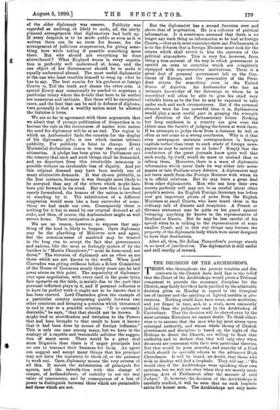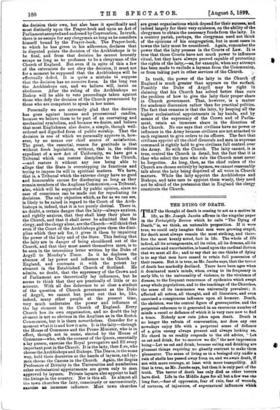THE DECISION OF THE ARCHBISHOPS. T HOSE who throughout the present
troubles and dis- contents in the Church have held fast to the belief that the Court of the Archbishops would prove a Tribunal Competent to provide the necessary discipline for the Church, may fairly feel their faith justified by the admirable decision given on Monday in regard to the liturgical use of incense and the carrying of lighted candles in pro- cessions. Nothing could have been wiser, more moderate, and yet firmer in tone, and, in a word, more eminently judicial, than the judgment read by the Archbishop of Canterbury. That the decision will be obeyed even by the most extreme Ritualists we cannot doubt. To think other- wise is to assume that the men who lay most strobe upon episcopal authority, and whose whole theory of Church government and discipline is based on the right of the Bishops to direct the Church) are willing to flout that authority and to declare that they will only obey when decisions are consonant with their own particular theories. But that would be pure anarchy, and anarchy of a kind which should be specially odious to the advanced High Churchmen. It will be urged, no doubt, that those who wish to disobey will find a loophole. They will say : ' We would obey if the Archbishops were speaking their own opinions, but we will not obey when they are merely inter- preting Acts of Parliament after the manner of civil Judges.' If, however, the decision of the Archbishops is carefully studied, it will be seen that no such loophole exists for honest men. The Archbishops not only make the decision their own, but also base it specifically and most distinctly upon the Prayer-book and upon an Act of Parliament accepted and endorsed by Convocation. In truth, there is no escape for any clergyman as long as he considers himself bound by the Prayer-book. The Prayer-book, to which he has given in his adherence, declares that in disputed points the decision of the Archbishops is to be final, and from that decision he cannot honestly escape as long as he professes to be a clergyman of the Church of England. But even if in spite of this a few of the extremists do not obey the decision, it must not for a moment be supposed that the Archbishops will be effectually defied. It is quite a mistake to suppose that the decision has no coercive force. In the long run the Archbishops can, and we believe will, insist on obedience. After the ruling of the Archbishops no Bishop will be able to veto proceedings taken against those who defy the decision of the Church pronounced by those who are competent to speak in her name.
Personally we are extremely glad that the decision has gone against incense and processional candles, because we believe them to be part of an enervating and mechanical symbolism, and because we desire, and believe that most Englishmen also desire, a simple, though well- ordered and dignified form of public worship. That the decision is one of which we personally approve is, how.
ever, by no means our chief source of satisfaction.
The great, the essential, reason for gratitude is that without fresh legislation, without, that is, the odious expedient of a new Act of Uniformity, we have got a Tribunal which can restore discipline to the Church, —and restore it without any one being able to allege that the State is overstepping its functions and trying to impose its will in spiritual matters. We have, that is, a Tribunal which the extreme clergy have no good. and honourable excuse for disobeying as long as they remain members of the Anglican Communion,—a Tribunal, also, which will be supported by public opinion, since no case of conscience can be made out for repudiating its decisions. The only objection which, as far as we can see, is likely to be raised in regard to the Court of the Arch- bishops is, indeed, that it is too purely clericaL There is, no doubt, a certain danger that the laity—always anxious, and rightly anxious, that they shall keep their place in the Church, and that it shall never be admitted that the clergy, and the clergy alone, are the Church—will think th at even if the Court of the Archbishops gives them the disci- pline which they ask for, it gives it them by impairing the power of the laity and of the State. This feeling that the laity are in danger of being shouldered out of the Church, and that they must assert themselves more, is to be seen in the interesting letter written by the Duke of Argyll to Monday's Times. In it he deplores the absence of lay power and influence in the Church of England, and contrasts it with the potent lay element in the Established Church of Scotland. He admits, no doubt, that the supremacy of the Crown and of Parliament are theoretically lay influences, but he seems to think that they are practically of little or no account. With all due deference to so close a student of the question of Church government as the Duke of Argyll, we cannot but point out that he, like, indeed, many other people at the present time, very much underrates the power and influence of the lay element in the Church of England. Every Church has its own organisation, and no doubt the lay element is not so obvious in the Anglican as in the Scotch Communion, but it is there nevertheless. Consider for a moment what it is and how it acts. It is the laity—through the House of Commons and the Prime Minister, who is in effect, though not in name, elected by the House of Commons—who, with the consent of the Queen, essentially a lay person, exercise the Royal prerogative and fill every important post in the Church. It is the laity, ther.fore, who choose the Archbishops and Bishops. The Deane, in the same way, hold their deaneries at the hands of laymen, and lay- men choose the Canons in the Church. Again, the Regius Professors of Divinity in the Universities and numberless other ecclesiastical appointments are given only to men approved by laymen. Private laymen also appoint to half the livings in the country. Nor is this all. In almost all the town churches the laity, consciously or unconsciously, *Lenin an immense influence. Most town churches are great organisations which depend foitheir success, and indeed largely for their very existence, on the ability of the clergymen to obtain the necessary funds from the laity. In a country parish, perhaps, the clergyman need not think of the opinions of his congregation, but in most cases in towns the laity must be considered. Again, remember the power that the laity possess in the Courts of Law. It is true that those Courts have not much power to influepce ritual, but they have always proved capable of protecting. the rights of the laity,—as, for example, when any attempt has been made to exclude a layman from the Communion, or from taking part in other services of the Church.
In truth, the power of the laity in the Church of England is much greater than appears on the surface, Possibly the Duke of Argyll may be right in claiming that his Church has solved better than ours the problem of how to give the laity their proper share in Church government. That, however, is a matter for academic discussion rather than for practical politics. The fact that remains is that the laity, by keeping all the higher ecclesiastical appointments in lay hands, and by means of the supremacy of the Crown and of Parlia. meat, retain an immense share in the direction of the Church. No one says that civilians have no power or influence in the Army because civilians are not attached to each regiment to give orders to its officers. The fact that civilians appoint all the chief Generals and men in supreme command is rightly held to give civilians full control over the Army. So with the Church. The laity cannot, it is true, control the Church in detail, but the fact that it is they who select the men who rule the Church must never be forgotten. As long, then, as the chief rulers of the Church are chosen entirely by laymen, we cannot reasonably, talk about the laity being deprived of all voice in Church' matters. While the laity appoint the Archbishops and Bishops, and take care to appoint them wisely, they need not be afraid of the pretension that in England the clergy constitute the Church.



































 Previous page
Previous page